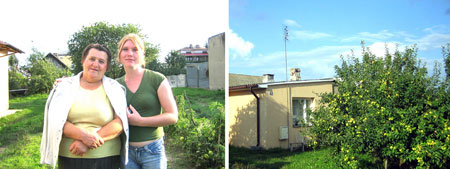I am in Poland now, traveling from city to city in this vast land of my ancestors, finding it ever more surprising each passing day.
After a strange encounter in a monastery in Lublin, where I met a man who couldn't fall asleep because "there are too many Jews in the world" and their image chases him late in the night, I made my way to Radzyn, to visit the town where my great grandparents once lived and where one of them established a Hasidic dynasty that was to be known as "The Radzyner Court."
No Jews live in Radzyn today, a town that once boasted a Jewish majority, so I went to the cemetery to see the graves and, perhaps, unfold some details that I don't yet know. But soon I found out that the cemetery was razed by the Nazis, all the headstones long gone; the Nazis, apparently, needed marbles for their rebuilding efforts in the East. As if this was not enough I soon learned that the graves themselves were nowhere in sight either. The Polish government, long after the war was over (to be precise, in 1957), erected a neighborhood on top of the Jewish cemetery, never bothering to move the graves.
With the help of a local pastor I finally located the house built on top of my family's graves. A cheerful lady greets me as I come in. Her name, she says, is Basha ("Barbara") and she is very happy to live here. The dead bodies of Jews under her house have brought her much luck. "I am a blessed woman," she joyfully says.
Years ago she turned her backyard into a little "field" where she grows vegetables and "very sweet" apples.
"The bodies of dead Jews," she explains, "make the earth very fertile when they get mixed with the soil."
I almost collapsed. I couldn't believe my ears and eyes. To see the woman cheerfully telling how she uses the dead Jews underneath--my great grandparents--as a fertilizer, was horrific. But she saw no reason for sadness. "Do you want an apple?" she asks. She's surprised that I don't grab an apple or two. "These apples are so good, you couldn't find like them in any store. Anywhere"
Basha enjoys having guests and loves chatting with her visitor. A few years ago, she recalls laughingly, a man's hand came sticking out from the earth (obviously she can recognize different bone structures and knows what they once used to be). When her teenage daughter, Dorota, saw it she got scared. But Basha told her not to worry. She put the hand back in the earth and then plowed her little field, grinding that hand to get maximum effect. "Look at my apples, the best!" she says, smiling heartily.
She really likes her dead Jews. Sometimes, she tells me, she lies down at night and dreams of Jews who come to her bed to sleep with her. "At my age," she muses, "I don't mind if a Jewish man comes to visit my bed. Nobody else does." She laughs again. "A dead Jew will one day come to my bed thru the window; maybe" she adds.
All in all, she enjoys seeing me. The Jews, as she sees it, have been good to her.
"Many skulls underneath my house and my apple tree," she says and laughs a bit more.
When I ask her if she would feel as elated had the dead underneath her house and backyard been Christians instead of Jews, her cheerfulness suddenly disappears and she completely stops laughing. "No Christians; that would be terrible," she says. I ask her what's the difference between Jews and Christians, but she can supply no response. "Christians, no." And that was it.
Another man then comes in to greet me, the former mayor of Radzyn. "It's not their fault," he says to me; "it's the Communists who did it; not the Poles."
After the mayor had his say, the pastor takes me aside and asks for forgiveness. He assures me that he will pray in church; he'll definitely ask God to guide him and his flock.
But nobody offers to remove the remains out of this place.
I left the scene; it was just too hard to stay there any, any longer.
I head back to Lodz, my favorite city in Poland. The anti-Semitic graffiti all around the city doesn't bother me today: No one here, at least as far as I know, uses my dead grandparents as a fertilizer for his or her apple tree. That's an improvement.

Basha (l.) and Dorota; the apple tree & the house
To go back HOME, click www.JewishTheater.org

